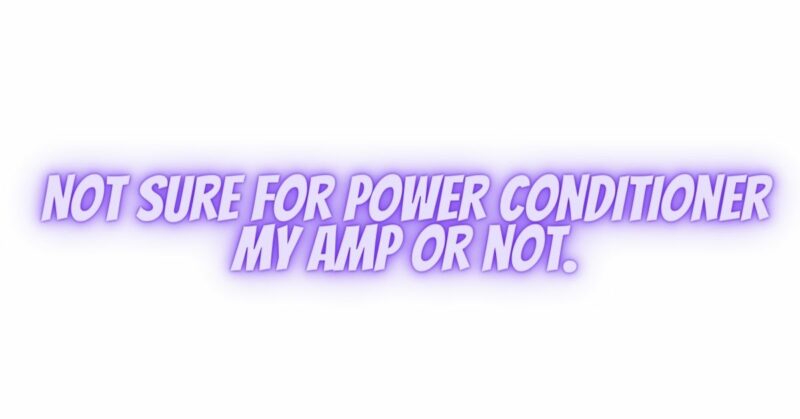In the world of audio and home theater systems, the quest for pristine sound quality and optimal performance often leads to discussions about power conditioners. These devices are designed to clean and stabilize the electrical power supplied to your audio components, including amplifiers, preamplifiers, and source equipment. However, the decision of whether or not to use a power conditioner can be a source of confusion for many audio enthusiasts. In this article, we will delve into the considerations and myths surrounding power conditioners to help you make an informed choice.
Understanding Power Conditioners
A power conditioner is essentially a surge protector on steroids. It not only safeguards your equipment from voltage spikes and surges but also aims to improve the quality of power flowing to your audio gear. Here’s a breakdown of the key features and functions of power conditioners:
- Voltage Regulation: Power conditioners often include voltage regulation to ensure that your audio components receive a consistent voltage level. This can help mitigate voltage fluctuations that might affect performance.
- Surge Protection: They provide protection against sudden voltage spikes and surges that can potentially damage your equipment.
- Noise Filtering: Many power conditioners claim to filter out electrical noise, including electromagnetic interference (EMI) and radio frequency interference (RFI), which can negatively impact audio quality.
- Isolation: Some advanced power conditioners offer isolation from the main power supply, preventing contamination from other components or appliances in your home.
Pros of Using a Power Conditioner
- Equipment Protection: Power conditioners can offer a degree of protection against power spikes and surges, which can extend the lifespan of your audio equipment.
- Improved Sound Quality: In some cases, power conditioners may help reduce electrical noise, resulting in cleaner audio signals and potentially improved sound quality.
- Stabilized Voltage: If your area experiences frequent voltage fluctuations, a power conditioner with voltage regulation can help maintain a steady power supply.
Cons of Using a Power Conditioner
- Cost: High-quality power conditioners can be expensive, and the investment may not always provide a noticeable improvement in sound quality.
- Limited Impact: In many audio systems, the difference in sound quality with and without a power conditioner may be minimal or even imperceptible.
- False Sense of Security: While power conditioners offer protection against some electrical issues, they cannot guard against all potential problems, such as lightning strikes or extreme power surges.
Making an Informed Decision
Deciding whether to use a power conditioner for your amplifier or other audio components depends on several factors:
- Electrical Environment: Consider the quality of your electrical supply. If you frequently experience voltage fluctuations or surges, a power conditioner may be a wise investment.
- Audio System Quality: High-end audio systems may benefit more from power conditioners than entry-level setups. The impact of a power conditioner on sound quality can vary greatly.
- Budget: Assess whether the cost of a power conditioner aligns with your overall budget for audio equipment and improvements.
- Listening Environment: The acoustics and ambient noise in your listening room can also influence your decision. In some cases, a power conditioner may be more beneficial in noisy environments.
Conclusion
The decision of whether or not to use a power conditioner for your amplifier and other audio equipment is not one-size-fits-all. While power conditioners offer protection and potential improvements in sound quality, their impact can vary widely depending on your specific setup and electrical environment. It’s advisable to prioritize critical aspects of your audio system, such as speaker quality and room acoustics, before considering a power conditioner. Additionally, you may want to audition a power conditioner in your system to determine if it makes a discernible difference that justifies the cost. Ultimately, the choice should align with your goals for audio quality and equipment protection.


